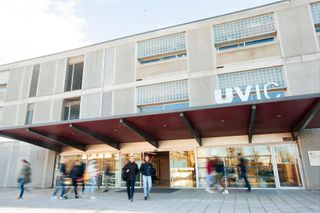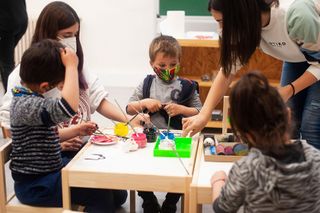- At the start of the academic year, the UVic-UCC entered the THE World University Rankings in the range 401-500, as the fourth best Catalan university and the sixth best university in Spain
- In September 2021, the institution’s new Strategic Plan was implemented. The plan is valid until 2026 and for the first time it incorporates the four entities that form part of the UVic-UCC project
The start of the academic year is always a time for change, for launching new projects, resuming others, establishing priorities and setting goals. For the UVic-UCC, several factors have come together to make the start of 2021-2022 especially unique. This uniqueness is not just due to a gradual return to pre-pandemic normality, with 100% face-to-face activities again and relaxation of some of the security measures. It is also due to three crucial events coinciding that represent a turning point for the history of the institution.

First, classes started with the incorporation into the university community of Elisava’s incoming students, teaching staff and administrative and service staff. Since last September, Elisava has been the new Faculty of Design and Engineering. This is the University’s seventh faculty, resulting from the entry of this institution into the UVic-UCC’s federal project. Second, September marked the launch of the institution’s new Strategic Plan, which will be in force from 2021 to 2026, and which, for the first time, incorporates all the entities that form part of the federation: the Balmes University Foundation, owner of UVic-UCC and the UVic campus; the Bages University Foundation, on the UManresa campus; the Foundation for Advanced Studies in Health Sciences (FESS), the owner of the Faculty of Medicine; and, of course, the Elisava University School Private Foundation.
Finally, the return after the summer holidays coincided with the news of the University's entry, for the first time, into the Times Higher Education (THE) World University Rankings (WUR). It has been placed in the 401-500 range out of a total of 1,662 public and private universities in 99 countries. In addition, it ranks fourth among Catalan universities and sixth among those in Spain which has 52 universities in the ranking. This all marked the start of an academic year in which, towards the end of May, the University will celebrate its 25th anniversary, that is, the anniversary of unanimous approval of the Law of Recognition of the University of Vic by the Parliament of Catalonia.
For the rector of the UVic-UCC, Josep Eladi Baños, the sum of all these factors shows “the success of our model, of the University’s strategic commitment and of the constant work of its community.” However, it also invites reflection: “we are no longer a small university; we are a consolidated university and more than ever it is essential to work to strengthen our teaching model, to further promote research, to unite the federated foundations and, above all, to retain our teaching and research staff and administrative and service staff and prevent the flight of talent.”

«Entering the THE’s World University Rankings (WUR) gives us considerable external reach and an international position that is difficult to achieve in other ways.»
The results obtained in the first listing of UVic-UCC in the WUR of THE “are great news for our institution and for all the people who are part of the university community. It is the result of collective effort and the sum of countless small successes over time.” This is the UVic-UCC rector’s opinion of the news. He considers that reaching this position in the ranking “opens new doors for the future and gives us considerable external reach, recognition as a solid institution and an international position that is difficult to achieve in other ways ” The UVic-UCC shares the position of fourth in Catalonia with the Ramon Llull University. At state level, it occupies the same rank as the University of Valencia.
To enter this ranking, universities must have published at least 150 indexed articles per academic year in the last five years and a minimum of one thousand articles in the last five years. “Research has a key weight not only in this ranking but in all rankings and influences the way they look at us from the outside,” emphasizes the Vice-Rector for Research and Knowledge Transfer, Jordi Collet, who goes a step further in his reflection: “For many centuries, the key in universities was teaching, and it was this that allowed teachers to do research.” Now, he says, this has changed, and “it is precisely research, the joint construction of knowledge with other agents and everything related to this (articles, citations, six yearly research increments, personal and institutional accreditations, rankings, defended theses) that allow members of teaching and research staff to teach.”
From the thirteen indicators that the WUR ranking of THE analyses, in the areas of teaching, research, knowledge transfer and internationalization, UVic-UCC obtained a particularly good position in research, specifically, in the area of citations in indexed journals, in which it is placed in position 146. “This is especially relevant if we consider that the UVic-UCC is a young university. It only made a firm commitment to research just over a decade ago and so far its research has mainly been funded through the University, with its own resources,” said the rector. Moreover, Baños considered that the good results in citations “show that both the quantitative and especially the qualitative dimensions of research have been ensured.”

«We are four foundations but one university and that is why the strategic plan shows what we want to be and how we will work to achieve it»
Research, knowledge transfer and innovation with impact and, more specifically, the promotion of “excellent thematic research that is recognized and committed to collaborative work, ethical principles and processes of quality” and “transfer and innovation that has an impact on local and global challenges” is one of the eight levers of change around which the new Strategic Plan of the UVic-UCC is structured for the period 2021-2026. In its plenary session last June, the Board of Trustees of Balmes University Foundation gave the green light to the strategy document that, for the first time, incorporates all the federation’s entities.
“The lack of one strategic plan was an anomaly that resulted from the uniqueness of our entity, and had to be resolved,” stated the rector. Before now, FUBalmes and FUBages had their own strategic plans, which were both completed last year, and the Foundation for Advanced Studies in Health Sciences (FESS) had a master plan. The Elisava Foundation, which was recently incorporated into the federation, also comes under the plan. The rector believes that “the message is clear: we are four foundations but one university,” and that is why “the plan shows what we want to be and how we will work to achieve the agreed goals.”
The plan establishes up to eight levers of change that will be key to moving towards the future model proposed by the UVic-UCC. In addition to research, transfer and innovation with impact, the rest of the levers are comprehensive training; the University’s own, innovative teaching model; thematic specialization; lifelong learning; talent; territory; and an international outlook. These levers are complemented by five strategic axes (training, research and transfer, sustainable organization, university community, and territorial roots and international reach) from which 18 strategic objectives and up to 74 actions are drawn, to be developed with a view to 2026.
The Strategic Plan is the result of a process of reflection and planning for the future of the institution that began in mid-2020 in the Board of Government and that, during the course of a year, involved more than a hundred people as part of a participatory process. “The past was reviewed critically and the current situation assessed jointly in the context of the scenario after Covid-19; strategic objectives were reviewed, updated and reformulated; and an operational plan and monitoring system have been drawn up,” concluded the rector.

Position in other rankings
The Times Higher Education (THE) magazine draws up university rankings to evaluate higher education institutions on the world stage. Its analyses focus on the three main areas of university activity: research, teaching and impact. The World University Rankings (WUR) of THE is not the only ranking that UVic-UCC has entered recently. Last April, the University was included for the first time in Impact Ranking 2021, which is also promoted by THE and evaluates universities worldwide on their achievement of the United Nations Sustainable Development Goals (SDGs). UVic-UCC was positioned in the middle range (in the 401-600 group) out of the 1,115 universities evaluated in 94 countries. Of the SDGs that were analysed, UVic stands out in those that refer to Health and welfare, Sustainable cities and communities, Climate action, and Alliance to achieve the SDGs.
The UVic-UCC is also present in other rankings. Over the last five years, the university has experienced a gradual improvement in various international and national rankings, both general and specialized. Among others, it occupies first position in the ranking on transparency of private universities according to the Fundación Compromiso y Transparencia report; 22nd place (among 77 Spanish universities) in the university ranking of the Fundación Conocimiento y Desarrollo; and it is in the fifth group of universities out of a total of 9 in the U-Ranking on the Spanish university system.

Engine of knowledge and innovation
UVic-UCC’s 2021-2026 strategic plan states that the institution’s mission is to be an engine of knowledge and innovation through teaching and research at the service of the territory and with an international outlook. It also states that it is a territorial-based university, centred on public service and with a private management model, and that it focuses on caring for students and their overall training so that future graduates can incorporate values of integrity in personal action, exactitude in the professional field and responsibility in the social field. Finally, it reinforces the desire to create links with the territory and to commit to the scientific, cultural, social and economic progress of Catalonia through a multi-campus model with its heart in central Catalonia.
The document also determines the institutional values of UVic-UCC, including the development of the human dimension of students and maintaining direct contact with them; fostering innovation, creativity, critical analysis and entrepreneurship; a rapid response to the needs of the environment and the cross-disciplinary nature and synergies between areas of knowledge, rigour, quality and excellence, transparency, an international outlook and alignment with the SDGs.